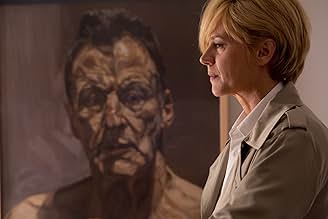Julieta
- 2016
- Tous publics
- 1h 39m
IMDb RATING
7.1/10
35K
YOUR RATING
After a casual encounter, a brokenhearted woman decides to confront her life and the most important events involving her estranged daughter.After a casual encounter, a brokenhearted woman decides to confront her life and the most important events involving her estranged daughter.After a casual encounter, a brokenhearted woman decides to confront her life and the most important events involving her estranged daughter.
- Nominated for 1 BAFTA Award
- 14 wins & 62 nominations total
Darío Grandinetti
- Lorenzo
- (as Dario Grandinetti)
Ramón Agirre
- Inocencio - portero
- (as Ramón Aguirre)
- Director
- Writers
- All cast & crew
- Production, box office & more at IMDbPro
Featured reviews
It's usually worth watching an Almodovar movie if only for the exquisite use he makes of the camera and the quality of acting he manages to extract from his cast. That is certainly the case with Julieta in which every scene is beautifully composed. Andalusia, Galicia and Madrid have never looked so enticing. Having said that, the narrative of this movie is really poor. It revolves in some sense around the theme of guilt but that doesn't stand up well to a close examination. The twist at the close is pure melodrama and the film doesn't really end at all. Almodovar just brings down the shutters on the movie. So this is very much a mixed bag. Lovely filming, lovely actors, lovely decor, but dare I say it, this is basically an art-house soap.
The screenplay of 'Julieta' is constructed with almost mathematical precision. In one of the first scenes, director Almodovar presents the question that is central to the rest of the film: what happened to the daughter of lead character Julieta? Most of the film consists of a long flashback, in which he slowly reveals the circumstances and events that led to her disappearance. At the end of the film, we are back in the present again, and we know everything there is to know.
It's a story Hitchcock would have been proud of: there is suspense, a beautiful blonde femme fatale, and psychological story elements. Not only the story, but also the cinematography is reminiscent of the master of suspense. Every scene is shot with extreme attention to lighting, colour and camera angle. Small details are the cherry on the cake: notice the way Almodovar introduces the birthday cake for the disappeared daughter: shot from above, as if it is a surreal work of art. Another example is the short sex scene in the train: the viewer sees only Julieta's head, but the rest of her body is reflected in the window pane behind her. As a director, Almodovar wants as much to be in control as Hitch. The result is a very beautiful film in every way - even the soundtrack is extremely tasteful.
'Julieta' is an elegantly filmed drama. There are no outrageous characters, exuberant scenes or other colourful elements we know from his earlier films. This is a restrained, precise and in every way immaculate piece of cinema.
It's a story Hitchcock would have been proud of: there is suspense, a beautiful blonde femme fatale, and psychological story elements. Not only the story, but also the cinematography is reminiscent of the master of suspense. Every scene is shot with extreme attention to lighting, colour and camera angle. Small details are the cherry on the cake: notice the way Almodovar introduces the birthday cake for the disappeared daughter: shot from above, as if it is a surreal work of art. Another example is the short sex scene in the train: the viewer sees only Julieta's head, but the rest of her body is reflected in the window pane behind her. As a director, Almodovar wants as much to be in control as Hitch. The result is a very beautiful film in every way - even the soundtrack is extremely tasteful.
'Julieta' is an elegantly filmed drama. There are no outrageous characters, exuberant scenes or other colourful elements we know from his earlier films. This is a restrained, precise and in every way immaculate piece of cinema.
In Madrid, the middle-aged Julieta (Emma Suárez) is packing her books to move to Portugal with her boyfriend Lorenzo (Dario Grandinetti). She goes shopping for the journey and stumbles upon Bea (Michelle Jenner), who was the best friend of her missing daughter Antia. They talk to each other and Bea discloses that Antia is married with three children. Julieta decides to stay in Madrid; breaks with Lorenzo; and rents an apartment in her former building, hoping that Antia contacts her. She decides to write the heartbreaking story of her life since she was a young woman and met her beloved future husband and Antia´s father Xoan (Daniel Grao) until the losses of Xoan and Antia.
"Julieta" is a dramatic romance by Pedro Almodóvar in a conventional style totally different from most of his previous works, since it is neither tacky nor aggressive to the Catholic Church; and using neither bright colors nor bizarre characters. Indeed it is a mature work disclosing the story of a middle-aged depressed woman that has her life affected for the loss of her beloved husband first and the last twelve years for the disappearance of her eighteen year-old daughter. The most important, the powerful drama never becomes a melodramatic soap-opera. The screenplay is very well-written with a perfect open end and magnificent cast. My vote is seven.
Title (Brazil): "Julieta"
"Julieta" is a dramatic romance by Pedro Almodóvar in a conventional style totally different from most of his previous works, since it is neither tacky nor aggressive to the Catholic Church; and using neither bright colors nor bizarre characters. Indeed it is a mature work disclosing the story of a middle-aged depressed woman that has her life affected for the loss of her beloved husband first and the last twelve years for the disappearance of her eighteen year-old daughter. The most important, the powerful drama never becomes a melodramatic soap-opera. The screenplay is very well-written with a perfect open end and magnificent cast. My vote is seven.
Title (Brazil): "Julieta"
My interest in Almodovar is rather muted. He doesn't excel in any of the ways of presenting the world that really matter to me but he does several things more than well, so every so often I visit. There is the desire to submerge ourselves in fiction, lose ourselves to self in order to wake to a fabric that extends from self. That's Talk to Her for me.
But like Woody Allen or the Coens, he has consistently worked for so long on the same motifs that coming to him is also a matter of is he particularly inspired that day. I'm pleased to say he is.
In the individual pieces of cinematic craft, this is not particularly exceptional. If you're heavily inclined to how story resolves drama, you will see here something that simply trails off near the end. The symbolic motifs greet us upfront; a deer in slow-motion, tumultuous sea out the window. His bright reds on walls and the like are not something I can get excited about, in this or any film.
But he is inspired today on the fundamental matter of self passing through self. He manages to do this with just a few strands of narrative. There is the young woman who was on her way to all life ahead of her that night on the train, who finds herself yanked by unexpected passion. There is the house of passion in the small fishing village, eerily explored with Hitchcock hues. And there is bewildering loss as she wanders away a widowed mother.
Above all I love here the sense of transition. Almodovar does so well - his actress helps - in spinning narrative to explore tragedy. He says enough about the jittery urge for adventure as a story we throw ourselves in so that we can infer more fleeting illusion around the crushing melodrama about life breaking down. She's not just this grieving woman that another film, say, in the realist format would have simply followed around Madrid; we're privy to all this richness of her young self having set off in search. Things couldn't have only worked this way for her, it's important to see; but sometimes they do, sometimes setting out for open sea means finding yourself marooned on an island, nothing right or wrong.
And Almodovar is ineluctably Spanish, meaning Catholic; so communion with the fleeting, transcendent stuff must take place firmly within ritual, in his case (just like Ruiz before) fiction. The whole is narrated by an author writing the story down as she waits in her apartment, shifting us forward and back. It speaks about the imaginative mind being burdened by the narratives of memory. For Almodovar, there is merit in the effort. Had she not stayed behind to write, she would have missed the letter. Even more pertinently for me, there is a bedridden mother (a mirrored woman) who is allowed to languish in her room, written off as an invalid. But when her daughter comes to visit, the recognition nourishes her back to her feet.
But like Woody Allen or the Coens, he has consistently worked for so long on the same motifs that coming to him is also a matter of is he particularly inspired that day. I'm pleased to say he is.
In the individual pieces of cinematic craft, this is not particularly exceptional. If you're heavily inclined to how story resolves drama, you will see here something that simply trails off near the end. The symbolic motifs greet us upfront; a deer in slow-motion, tumultuous sea out the window. His bright reds on walls and the like are not something I can get excited about, in this or any film.
But he is inspired today on the fundamental matter of self passing through self. He manages to do this with just a few strands of narrative. There is the young woman who was on her way to all life ahead of her that night on the train, who finds herself yanked by unexpected passion. There is the house of passion in the small fishing village, eerily explored with Hitchcock hues. And there is bewildering loss as she wanders away a widowed mother.
Above all I love here the sense of transition. Almodovar does so well - his actress helps - in spinning narrative to explore tragedy. He says enough about the jittery urge for adventure as a story we throw ourselves in so that we can infer more fleeting illusion around the crushing melodrama about life breaking down. She's not just this grieving woman that another film, say, in the realist format would have simply followed around Madrid; we're privy to all this richness of her young self having set off in search. Things couldn't have only worked this way for her, it's important to see; but sometimes they do, sometimes setting out for open sea means finding yourself marooned on an island, nothing right or wrong.
And Almodovar is ineluctably Spanish, meaning Catholic; so communion with the fleeting, transcendent stuff must take place firmly within ritual, in his case (just like Ruiz before) fiction. The whole is narrated by an author writing the story down as she waits in her apartment, shifting us forward and back. It speaks about the imaginative mind being burdened by the narratives of memory. For Almodovar, there is merit in the effort. Had she not stayed behind to write, she would have missed the letter. Even more pertinently for me, there is a bedridden mother (a mirrored woman) who is allowed to languish in her room, written off as an invalid. But when her daughter comes to visit, the recognition nourishes her back to her feet.
I'm a big fan of Almodóvar's work, his movies follow my life since I was a teenager, I always adore his early work, movies like "Kika", "High heels" and "Women on the Verge of a Nervous Breakdown" are still considered by me as the height of his career - a bizarre comedy- dramas with a kinky side and raw edges.
in the late 90's Almodóvar became famous worldwide with movies such as "live flesh" "all about your mother" and "talk to her" a melodramatic movies that touched us with a unique approach and vivid colors.
this movie is similar to his big successful movies from the late 90s: the women are in the center of the story where the men pushed aside, there is still a melodramatic approach and lots of mysteries that similar to an onion, piled up slowly, layer by layer until the very end of the movie. the colors are vivid like most of his movies, especially the red color, a sign of passion for Almodóvar, just like his Characters who drive themselves by their total passion to life and love.
so, is that movie good? if you want to compare it to his best and famous work - "all about your mother" and "talk to her" then this movie will lose the fight, it's less sophisticated and the plot has less twists, but still it's a good movie with a touching plot, good acting and a great director who hasn't lost his touch.
in the late 90's Almodóvar became famous worldwide with movies such as "live flesh" "all about your mother" and "talk to her" a melodramatic movies that touched us with a unique approach and vivid colors.
this movie is similar to his big successful movies from the late 90s: the women are in the center of the story where the men pushed aside, there is still a melodramatic approach and lots of mysteries that similar to an onion, piled up slowly, layer by layer until the very end of the movie. the colors are vivid like most of his movies, especially the red color, a sign of passion for Almodóvar, just like his Characters who drive themselves by their total passion to life and love.
so, is that movie good? if you want to compare it to his best and famous work - "all about your mother" and "talk to her" then this movie will lose the fight, it's less sophisticated and the plot has less twists, but still it's a good movie with a touching plot, good acting and a great director who hasn't lost his touch.
Did you know
- TriviaAll the sculptures made by Ava are in reality made by Miquel Navarro, a well known artist from Spain.
- GoofsWhen the train does an emergency brake and luggage and people are being tossed all over the place a coffee cup and coffee pot in front of the main character remains undisturbed.
- ConnectionsFeatured in Fandor: The High Art of Pedro Almodóvar's Camp (2018)
- SoundtracksPlaying the Piano 2009
Written and Performed by Ryuichi Sakamoto
- How long is Julieta?Powered by Alexa
- What are the three Ancient Greek words for the sea?
Details
- Release date
- Countries of origin
- Official sites
- Language
- Also known as
- Джульєтта
- Filming locations
- Redes, A Coruña, Galicia, Spain(Xoan's home)
- Production companies
- See more company credits at IMDbPro
Box office
- Budget
- €1,350,000 (estimated)
- Gross US & Canada
- $1,490,948
- Opening weekend US & Canada
- $64,044
- Dec 25, 2016
- Gross worldwide
- $22,521,904
- Runtime1 hour 39 minutes
- Color
- Sound mix
- Aspect ratio
- 1.85 : 1
Contribute to this page
Suggest an edit or add missing content


![Watch Tráiler [OV]](https://m.media-amazon.com/images/M/MV5BYTZiMjRjZWMtM2NmMC00MTNmLWJhMTAtMmJkYjgxNjk3YWVhXkEyXkFqcGdeQXRodW1ibmFpbC1pbml0aWFsaXplcg@@._V1_QL75_UX500_CR0)






































